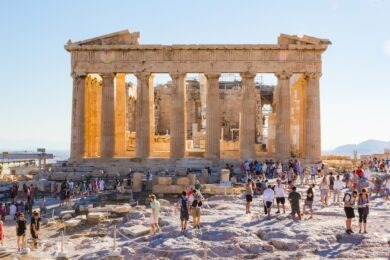In a decision that will have a significant impact on the tourism industry, President Donald Trump spoke in front of a room full of supporters in the Little Havana community of Miami, Florida, on Friday to officially announce and sign his new policy on the United States’ relationship with Cuba.
In his speech, Trump vowed to “enforce the ban on tourism.”
“The previous administration’s easing of travel and trade does not help the Cuban people,” Trump said. “They only enrich the [Castro] regime. The profits from investment and tourism flow directly to the military. Therefore, effective immediately, I am cancelling the last administration’s completely one-sided deal with Cuba.”
One of the biggest changes Americans will see enforced is the revoking of former President Barack Obama’s allowance of individual people-to-people travel. While approved people-to-people travel will remain legal as one of 12 categories, only group travel will be permitted. Itineraries will be strictly monitored and enforced.
Meeting professionals are already accustomed to coordinating and implementing minute-by-minute schedules, so by incorporating approved cultural activities into the daily plan, Cuban travel might still be a viable possibility for them. (The Miami Herald reports that individual travel will still be allowed for Americans who qualify for the support for the Cuban people category.)
A senior White House official spoke on Thursday about Trump’s decision to end individual people-to-people trips. “That is a category of travel that is particularly ripe for abuse,” the official said. “So, directing the Treasury to change its regulations to ensure that anyone who goes to people-to-people travel does so as part of a group is one way to ensure that the individuals who travel to Cuba to engage in a schedule of activities do so and aren’t sitting on the beach.”
New hotel restrictions for Americans
Americans will also be prohibited from staying in hotels with ties to the Cuban government and military. The Trump administration is seeking to promote the Cuban citizens’ freedom to be entrepreneurs and encourages Americans traveling there to stay in privately owned hotels and Airbnbs. Meeting professionals who often coordinate travel for large groups of people will face difficulty when booking accommodations.
While group travel will still be permitted under this new directive, the restraints on which hotels Americans can stay in will pose challenges because the privately run hotels and Airbnbs cannot support a large number of guests. The senior White House official said that the State Department would release a list of hotels owned by Cuban military organizations, Grupo de Administracion Empresarial, S.A. (GAESA), so that Americans could avoid booking rooms at those properties.
“Over the past few years, hundreds of thousands of Americans have traveled to Cuba, stayed in private homes, eaten at privately owned restaurants, taken private taxi cabs and engaged with the Cuban people,” said Engage Cuba in a statement. “Americans are significantly contributing to the growth of Cuba’s private sector
“This policy will undoubtedly stifle U.S. demands to travel to the island. Additionally, by requiring Americans to travel in tour groups, the administration is not only making it more expensive for everyday Americans to travel to the island, but pushing them away from staying in private homes—which are unable to accommodate large tour groups—and into state-run hotels.”
Cruises remain unaffected
Trump’s new policy does not restrict the cruise ship industry from moving forward with their trips to Cuba. This might be a great alternative for meeting professionals to consider. Cruises are all-inclusive and can accommodate groups of any size, and guests can stay on the boat overnight, thus eliminating the need to book hotel rooms on the island nation.
“We will review the extent of the tightening of the travel rules, but our guests have already been traveling under the 12 approved forms of travel to Cuba since we first undertook our historic first cruise to Cuba more than a year ago,” Carnival Cruise Line said in a statement to NBC News.
Royal Caribbean also reacted to the news by Tweeting, “We’re pleased to share there is no impact to any of our cruises to Cuba as announced in the new U.S. policy toward Cuba today.”
Demand expected to drop
Commercial airlines will also be allowed to continue to offer flights to Cuba from the United States, but the tougher rules will likely cause demand to drop significantly. Airlines will review the new policies and adjust their business model to comply.
According to the website consumerist.com, American, United, Delta, Southwest, JetBlue and Alaska currently fly to Cuba from the United States. Meanwhile Sun Country postponed the launch of its service until the winter. Already noticing a demand decrease in Cuban travel, Spirit, Silver and Frontier left the market and JetBlue and American shifted to smaller planes.
ABC News reports that, according to the Cuban Ministry, “74 percent more American citizens visited the island in 2016 than in 2015.” U.S. Rep. Rick Crawford from Arkansas tweeted a GIF on Friday that says, “Over the next four years, reversing Cuba policies would cost the U.S. $3.4 billion from the travel industry.”
President Trump’s personal agenda?
Some skeptics have raised concern about Trump’s motives. In 2016, he told CNN he wanted to open Trump hotels in Cuba “when we’re allowed to do it.” But he agreed not to open new overseas properties while he is in office. This move is seen by some as an effort to stifle his competitors in the hotel industry from expanding to Cuban shores during his presidency.
“Trump’s prohibition, in effect, puts other hotel companies on equal footing with his personal company—not allowed to pursue future business in Cuba,” CNN said.
Hotels with current plans will be allowed to move forward with construction, though. The senior White House official said that “the administration’s intent has been to not disrupt the existing business that has occurred.”
Marriott International, which oversees Four Points by Sheraton Havana, was less celebratory than the cruise lines because there is a lot of uncertainty in the future of the hotel business in Cuba.
“We have invested significant resources establishing a presence in Cuba, and with one hotel open and another in the pipeline we have just begun our work creating opportunity and a more vibrant tourism sector on the island,” the hotel chain said in a statement to NBC News. “We are still analyzing the policy directive issues by the president today, and its full effect on our current and planned operations in Cuba may depend on related forthcoming regulations.”
Changes won’t be implemented until the secretaries of Treasury and Commerce change their regulations, which could take some time. They are required to begin the process within 30 days, but there is no telling how long the process will take until it’s completed. The senior White House official said it will be up to the Treasury Department to determine how the policy will impact people who have booked trips to Cuba, but have not yet traveled there.
Trump says he intends to continue working with Cuba. “Our embassy remains open in the hope that our countries can forge a much stronger and better path,” he said Friday.




